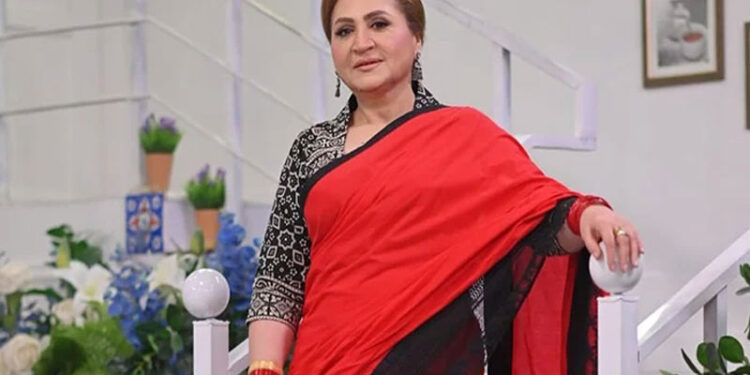In the age of smartphones and digital communication, cybercrime and online fraud have become increasingly common, affecting not only ordinary individuals but also celebrities and public figures. Recently, the renowned Pakistani actress Asma Abbas, known for her decades-long contributions to television, theater, and film, became the victim of a cyber scam when her WhatsApp account was hacked.
The incident, which involved fraudulent money requests being sent from her number, not only highlights the growing problem of online scams but also serves as a reminder to the public about the importance of digital security and awareness.
Who is Asma Abbas?
Asma Abbas is one of Pakistan’s most respected actresses, admired for her versatility, grace, and strong presence on screen. She is the sister of legendary actress Bushra Ansari and has been part of the Pakistani entertainment industry for several decades.
- Known for roles in hit dramas like Ranjha Ranjha Kardi, Deewar-e-Shab, and Aangan, Asma Abbas has built a loyal fan following.
- Beyond acting, she is also a singer and fashion designer, showcasing her multifaceted talent.
- Her resilience and courage are also admired; she publicly fought and survived cancer, becoming an inspiration for many.
Given her popularity and public presence, her WhatsApp hack quickly became a matter of public interest, drawing attention to the dangers of cyber scams.
Details of the WhatsApp Hacking Incident
According to reports, the hacking incident came to light when her sister, the iconic actress Bushra Ansari, shared a screenshot on social media.
- The screenshot showed a suspicious message from Asma Abbas’s WhatsApp account, where the hacker impersonating her asked actor Ibrahim for Rs 1 million.
- Bushra Ansari immediately warned fans and colleagues: “Please do not trust such messages.”
This quick response prevented further potential damage, but it also highlighted how cybercriminals often exploit trust between acquaintances and colleagues.
How the Hack Happened: The WhatsApp Verification Code Scam
Asma Abbas later revealed on her social media accounts how her WhatsApp got hacked. She explained that she received a phone call in which the caller claimed to be from a delivery service.
- The scammer told her that a parcel had arrived and she needed to share a WhatsApp verification code for confirmation.
- Believing the explanation—since her daughter Zara had indeed sent her some items—she assumed the delayed delivery was due to rainy weather.
- Trusting the caller, she shared the code, and within moments, her WhatsApp account was compromised.
This is a common cyber fraud technique where scammers trick individuals into sharing sensitive information like OTP codes or verification codes, which gives them instant access to accounts.
Asma Abbas’s Warning to the Public
After regaining access and exposing the fraud, Asma Abbas issued a strong warning to her fans and the general public:
- She urged people to ignore any suspicious messages sent from her account during the time it was hacked.
- She emphasized that no one should share personal details or verification codes over the phone.
- She warned that cybercriminals often use emotional manipulation, such as pretending to be in financial distress or claiming to represent a delivery service.
Her warning resonates with countless others who have fallen prey to similar scams.
Bushra Ansari’s Role in Exposing the Scam
Bushra Ansari, being a veteran actress and influential figure in Pakistan’s entertainment industry, played a crucial role in exposing the scam. By immediately sharing the fraudulent screenshot, she:
- Alerted fans and industry colleagues about the hack.
- Helped prevent others from transferring money to the hacker.
- Sparked a broader discussion on digital fraud and online safety in Pakistan.
This swift action reflects how family support and awareness can play a big role in minimizing damage caused by cybercrime.
The Rise of Cyber Fraud in Pakistan
The incident involving Asma Abbas is not isolated. Pakistan, like many other countries, has seen a sharp rise in cybercrime cases, particularly involving:
- WhatsApp hacks
- Online banking scams
- Fake parcel delivery frauds
- Impersonation schemes targeting family and friends
According to the Federal Investigation Agency’s (FIA) Cyber Crime Wing, thousands of such complaints are registered every year, with women and public figures being particularly vulnerable due to their visibility.
Common Techniques Used by Hackers
Cybercriminals use various methods to gain access to personal accounts:
- Phishing Calls: Pretending to be delivery companies, banks, or service providers.
- WhatsApp Verification Code Theft: Asking victims to share OTP codes sent to their phones.
- Fake Money Requests: Messaging friends and colleagues asking for urgent financial help.
- Malware Links: Sending links that install spyware or steal login details.
- SIM Swapping: Taking over phone numbers to gain access to apps like WhatsApp.
In Asma Abbas’s case, the scam followed the verification code theft method.
Impact of WhatsApp Hacks on Victims
For celebrities like Asma Abbas, a hacked WhatsApp account not only risks financial fraud but also raises concerns about privacy, personal data, and reputation.
- Financial Loss: Hackers may trick friends, family, and colleagues into sending money.
- Reputation Damage: Scammers may send inappropriate or misleading messages that tarnish the victim’s image.
- Emotional Distress: Victims often feel violated, embarrassed, and anxious about their private conversations being accessed.
Asma Abbas’s experience reflects how even tech-savvy and educated individuals can become victims when caught off-guard.
Tips to Stay Safe from WhatsApp Hacking
Cybersecurity experts recommend the following steps to avoid becoming a victim of such scams:
- Enable Two-Step Verification on WhatsApp to add an extra layer of security.
- Never share OTP or verification codes with anyone, no matter the reason.
- Verify suspicious calls by contacting the official helpline of the service provider.
- Educate family members about common scams, especially elderly relatives.
- Report suspicious activity to WhatsApp and, if necessary, to the FIA Cyber Crime Wing in Pakistan.
By following these practices, users can significantly reduce their risk of falling victim to digital fraud.
Public Reaction to the Incident
The news of Asma Abbas’s WhatsApp hack spread quickly on social media, with fans and fellow celebrities expressing both concern and support. Many praised Bushra Ansari for her quick action and appreciated Asma Abbas for publicly sharing her experience to warn others.
- Fans left comments encouraging Asma Abbas to stay strong.
- Cybersecurity activists used the opportunity to educate the public about online scams.
- The incident sparked a broader conversation about digital literacy and safety in Pakistan.
Conclusion
The hacking of Asma Abbas’s WhatsApp account is a wake-up call not only for celebrities but also for ordinary people. As cyber fraud becomes more sophisticated, awareness and caution are the best defenses.
Asma Abbas’s experience underscores the importance of:
- Vigilance in online interactions
- Not sharing sensitive information over phone calls or messages
- Spreading awareness to protect others from similar scams
Her courage in coming forward and openly sharing her ordeal highlights the need for collective awareness against cybercrime in Pakistan and beyond.
In the digital world, where a single code can compromise one’s entire identity, the message is clear: Stay alert, stay safe, and never trust unknown calls or messages.

























